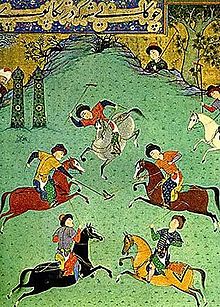Chovkan
| Chovkan | |
|---|---|
|
Intangible cultural heritage |
|

|
|
| Chovkan players in Isfahan, Iran |
|
| State (s): |
|
| List: | Representative list |
| Number: | 01282 |
| Admission: | 2017 |
Chovkan is a traditional equestrian sport . It is a team sport and a forerunner of modern polo . The players of a team riding on horses try to hit a ball with a long wooden stick into the goal of the opposing team formed by two goal posts . Chovkan is registered as intangible cultural heritage in Iran and Afghanistan .
history
Chovkan was created around the middle of the first millennium BC. The first written mention is found in the Medes . The game enjoyed great popularity in the Sassanid Empire . In late antiquity the game came in the Roman Empire . During the Islamic expansion it spread to Arabia and came to India under the Mughal emperors . British officers brought the game to Britain from India in the 19th century . By adding new rules, the sport of polo emerged .
Intangible cultural heritage
Iran
In Iran, Chovkan developed into a national sport, which was practiced, for example, under the Safavids on the central square of the then capital Isfahan before the eyes of the Shah . The sporting event is accompanied by a corresponding musical performance and the telling of stories. Chovkan in Iran is practiced together by the players, storytellers and musicians and combines cultural, artistic and sporting elements.
In 2017 UNESCO included the practice of Chovkan in Iran under the title “Chovkan, a horse riding game accompanied by music and storytelling” in the Representative List of the Intangible Cultural Heritage of Humanity .
Azerbaijan
| Chovkan | |
|---|---|
|
Intangible cultural heritage |
|

|
|
| Chovkan players in Azerbaijan |
|
| State (s): |
|
| List: | Intangible cultural heritage in need of conservation |
| Number: | 00905 |
| Admission: | 2013 |
In Azerbaijan, horses of the Caucasian Karabagh breed are traditionally used for Chovkan . The riders wear karakul hats , long, tight-fitting coats with a high waist as well as special trousers, stockings and shoes. The rules, skills and techniques of Chovkan are passed on to beginners by experienced players. However, with declining youth interest, urbanization and migration, the practice and transmission of the chovkan has been weakened, resulting in a shortage of players, coaches and Karabagh horses.
For this reason, UNESCO included the practice of Chovkan in Azerbaijan in 2013 under the title “Chovkan, a traditional Karabagh horse riding game in the Republic of Azerbaijan” in the list of the intangible cultural heritage in urgent need of conservation .
Web links
- Chovkan, a horse riding game accompanied by music and storytelling on the UNESCO Intangible Heritage Section website ( English and French ).
- Chovkan, a traditional Karabagh horse riding game in the Republic of Azerbaijan on the website of the Intangible Cultural Heritage Section of UNESCO ( English and French ).
Individual evidence
- ↑ Chogan, a horse-riding game Accompanied By music and storytelling. In: ich.unesco.org. UNESCO, 2017, accessed June 15, 2020 .
- ↑ Chovqan, a traditional Karabakh horse-riding game in the Republic of Azerbaijan. In: ich.unesco.org. UNESCO, 2013, accessed June 14, 2020 .

